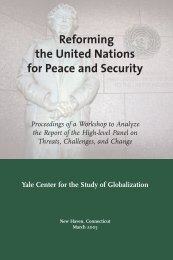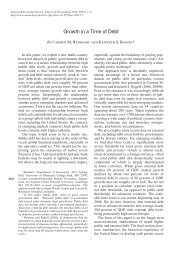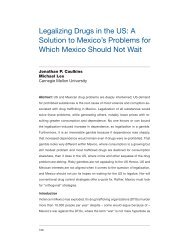The collapse of global trade, murky protectionism, and the crisis:
The collapse of global trade, murky protectionism, and the crisis:
The collapse of global trade, murky protectionism, and the crisis:
Create successful ePaper yourself
Turn your PDF publications into a flip-book with our unique Google optimized e-Paper software.
VOX<br />
Research-based policy analysis <strong>and</strong> commentary from leading economists<br />
Facilitation Agreement emerge? <strong>The</strong> challenge here is to capitalize on progress in <strong>the</strong><br />
WTO <strong>trade</strong> facilitation negotiations to speed up implementation <strong>of</strong> much needed<br />
reforms.<br />
While <strong>the</strong>re are many possible variations on <strong>the</strong> <strong>the</strong>me <strong>the</strong>re are essentially only<br />
two possibilities thus far articulated.<br />
<strong>The</strong> first involves securing agreement to separating <strong>trade</strong> facilitation from <strong>the</strong> "single<br />
undertaking" requirement <strong>of</strong> <strong>the</strong> DDA <strong>and</strong> treating success in <strong>the</strong> <strong>trade</strong> facilitation<br />
negotiations as a so called "early harvest". However, <strong>the</strong> negative reaction among<br />
large segments <strong>of</strong> <strong>the</strong> WTO membership suggests that such an approach is not politically<br />
viable. A so called "early harvest" simply isn't going to happen.<br />
A second, arguably more realistic option, would involve speeding up conclusion <strong>of</strong><br />
<strong>the</strong> content <strong>of</strong> a new <strong>trade</strong> facilitation agreement <strong>and</strong> <strong>the</strong>n moving rapidly toward<br />
effective implementation in advance <strong>of</strong> a comprehensive Doha deal. Such an<br />
approach would front-load <strong>the</strong> development benefits <strong>of</strong> <strong>the</strong> <strong>trade</strong> facilitation agenda<br />
<strong>and</strong> would capitalize on <strong>the</strong> fact that many members are already implementing customs<br />
<strong>and</strong> logistics reforms in <strong>the</strong>ir own self interest as part <strong>of</strong> larger programs to<br />
improve competitiveness. Moreover, moving toward immediate implementation<br />
would test donor willingness to provide adequate technical assistance resources <strong>and</strong><br />
do much to allay <strong>the</strong> remaining concerns <strong>of</strong> developing countries.<br />
Progress in implementation would lay <strong>the</strong> foundation for rapid approval <strong>of</strong> any<br />
Trade Facilitation Agreement as part <strong>of</strong> a comprehensive Doha deal. This option effectively<br />
postpones <strong>the</strong> need to secure full consensus on <strong>the</strong> DDA agenda while not postponing<br />
implementation <strong>of</strong> a range <strong>of</strong> practical measures where <strong>the</strong> benefits for all<br />
Members are not in dispute.<br />
As a starting point, <strong>and</strong> where dem<strong>and</strong> from Members was clearly articulated,<br />
donors could assist developing country members to prepare practical implementation<br />
action plans to both guide <strong>the</strong> implementation process <strong>and</strong> to provide a basis for discussions<br />
between recipient countries <strong>and</strong> donors.<br />
Such an approach would <strong>of</strong> course need to build on existing donor efforts as well<br />
as assessments <strong>and</strong> action plans already in place where <strong>the</strong>y exist. 29 Commitment to<br />
support implementation <strong>of</strong> <strong>the</strong> needs identified would <strong>of</strong> course be a matter for discussion<br />
between potential donors <strong>and</strong> recipient countries but would ensure some <strong>of</strong><br />
<strong>the</strong> key criteria identified above could be addressed. <strong>The</strong> development <strong>of</strong> such implementation<br />
action plans would also assist members to better identify <strong>and</strong> calibrate <strong>the</strong><br />
timing <strong>of</strong> binding commitments to <strong>the</strong>ir own implementation capabilities.<br />
Two objections might surface about this strategy.<br />
Some might say that implementing reforms undermines bargaining power <strong>of</strong> one<br />
or ano<strong>the</strong>r coalition on <strong>the</strong> single undertaking.<br />
However, it is unlikely that that any <strong>of</strong>fensive interests in <strong>trade</strong> facilitation are so<br />
great that a defensive posture would precipitate movement in o<strong>the</strong>r, more difficult,<br />
parts <strong>of</strong> <strong>the</strong> negotiation.<br />
More importantly, <strong>trade</strong> facilitation is one area where <strong>the</strong> gains transparently<br />
accrue to those that implement reforms.<br />
It <strong>the</strong>refore makes no sense for any government to hold important reforms hostage<br />
to an agreement in Geneva.<br />
This approach would provide a sound framework to guide delivery <strong>of</strong> <strong>trade</strong> related<br />
29 A six country case study undertaken in 2006 by <strong>the</strong> World Bank, <strong>the</strong> IMF <strong>and</strong> <strong>the</strong> WTO noted that<br />
none <strong>of</strong> <strong>the</strong> countries studied were starting from scratch <strong>and</strong> that all had reform efforts underway in<br />
<strong>trade</strong> facilitation. In many cases implementation <strong>of</strong> <strong>the</strong> measures under negotiation in <strong>the</strong> WTO could<br />
be accommodated by modifying existing donor financed projects.<br />
102





